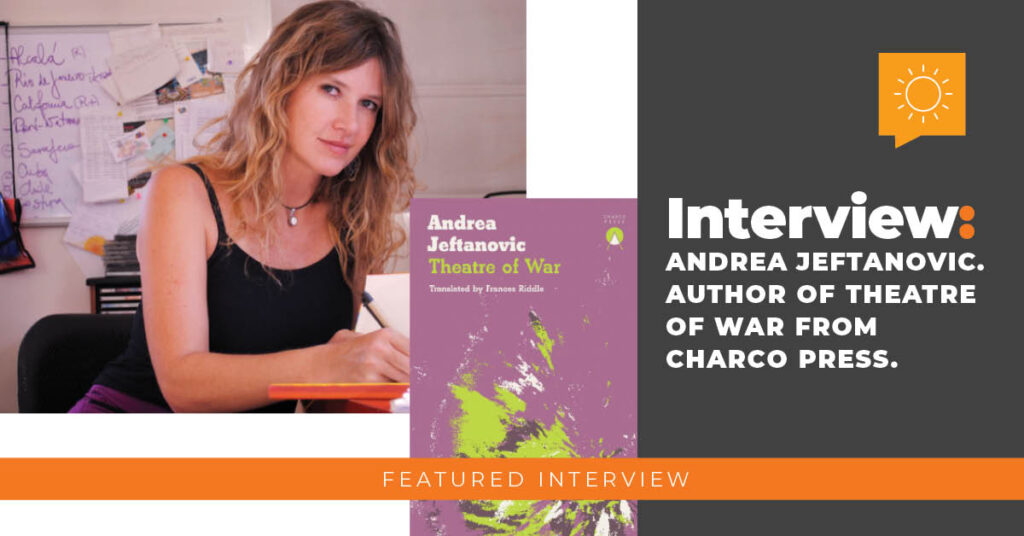
BY ANTHONY CARINHAS
Thank you for joining us today, Andrea, I’m excited to discuss your novel Theatre of War in our summer issue. I also want to thank Carolina Orloff and Charco Press for arranging this interview.
Theatre of War was first published in Spanish in 2000. How long did the process take, from the point Charco Press contacted you or your agent to getting the book published into English, translated by Frances Riddle? What sort of emotions surfaced while that whole process took shape?
AJ: Since the first contact with Carolina Orloff I had to wait maybe a couple of years. However, what I would never anticipated was that the book would be released at the beginning of the Covid pandemic.
Beyond that, I am very impressed with and grateful for Frances’ work in translating the novel. Reading Frances’ translation, I was struck by the use of poetry and the rhythm she chose. The English language tends to be more concise and accurate, so it was revelatory for me, as the author, to re-read my own piece with that emotional distance. In addition, I loved the Charco Press catalog and the delicate cover design by Pablo Font.
Tamara narrates the story in a series of three acts she’s partaking in, since the play is based on her life. She’s nine when the novel begins, but by the time it finishes, Tamara’s in her mid-twenties. How did you come up with the concept of Tamara directing a play in order to make sense of the pain she and her family endured from the Balkan war?
AJ: There are three different approaches to this question.
The novel, to be precise, involves three historical events: World War II, the Chilean dictatorship, and Balkans War (in the 1990s).
First, the theatrical resource. I love drama and have been a theater critic and researcher for years. While I was writing, I had in mind Bertolt Brecht’s theater. He says that in epic theater, the audience should have the opportunity to reflect and to experience what he called “critical distance”.
At the same time, I wanted to display the child’s point of view, free from ideological apprehensions, so that the protagonist could observe what was happening in her environment in a playful way, resorting to the theatrical play that transforms her life into a mise-en-scène. In fact, it might be the reason why I wanted to explore a narrative “from childhood”. I have been interested in childhood as an aesthetic horizon, as a “steep” gaze (one standing on tiptoes) or one that looks at the world from the knees of adults. I am interested in this opposition between the child’s and the adult’s gaze, almost as opposed to categories. It is also a contradictory, ambivalent place. Fiction from childhood—always a strategic device—becomes a machine that pushes the notion of subjectivity. It pushes language and the imaginary into unforeseen areas.
Children’s point of view can be a critical perspective, because of their subversive power for denouncing violence and abuse of power.
The book has graphic descriptions of lost body parts and various other tragedies that pop up in the war-torn regions. The book heavily examines memory and how it is distorted by events like PTSD, trauma, loss, illness, and poverty. What made you focus on the abstract themes of war rather than reference it specifically?
AJ: In the novel, I wanted to explore the devastating psychological effects that war and dictatorship—a nameless one—have on a family, through the eyes of Tamara, a nine-year-old girl. How they, as a family, redesign their existence, the life strategies that arise from damaged memory. However, I was drawn to speak about war or dictatorship not as a verbal discourse but through the body: what happens to the limbs, with issues like food, how we somatize that trauma. In addition, the theater was a resource where staging became the place to depict this pain, these traumas, and the circular journeys.
At the same time, I am very drawn to dreamlike language, because of its plasticity and the richness of its many symbols. I think “reality” is not enough to explain our complexity, our lives; I do believe in dreams as texts, as narratives we should rely on. I thought it was a chance to experiment with memory; a complex genre; but I wonder, what happens when our memories come from catastrophic loss? When memory comes from experiences such as wars, persecutions, or dictatorships, a process is organized around “black holes” (secrets or disappeared relatives). There is a lack of references in the chain of memory, facts that were blocked or that were not properly translated. Especially when you are dealing with memories that were inscribed in a different language. It is possible that second generations somehow look for or invent missing links, to make up for these silences and absences.
In that sense, writing fiction is like a response to that catastrophic loss that might help complete that vacuum, keeping the explosion from sweeping everything away, leaving us without words, without intergenerational memory. I think that remembering is closer to the exercise of evoking something from the past than rebuilding it. So, why not consider memory as a creative exercise and desire for transformation?
Nevertheless, at the same time, memory is a concrete experience around objects, places and people.
What about war do you loathe most?
AJ: Everything!
The writing is effective in the way people remember their lives because memory isn’t chronological, but rather a montage of significant events that shape us. Was this difficult to put down on paper or did the process come easily to you?
AJ: I think that when remembering, there are no pristine memories, but blurred memories. When we remember, we do so using imagination and our world’s point of view. In addition, if that point of view comes from a child, from a teenager, someone whose body and mind is in evolution, it is more fascinating. Indeed, memory is not a static process; it is dynamic and porous; it is a chaotic and poetic territory. So, to begin this novel with a main character as a young girl and to end it with her as an adult woman was an opportunity to experience so many important vital events: love, sexuality, illness, death, and more.
I was a person who lived, as a child and teenager, under Pinochet’s dictatorship, where war memories of my predecessors were superimposed on images of weapons, torture, detention centers, and soldiers in the streets. Also, intimidation, and the helicopters flying over the city. Perhaps, I think—I have said it before—that I write to say everything that was silenced in those years.
Thus, my cultural identity was signed into a damaged genealogy. Stories of persecution, cities under siege, fear, hunger, abrupt departures, and painful journeys to unknown destinations collided in my heritage, forcibly stripped of our roots. At the same time, when I write, I am not writing the story of my parents, or about the adult victims of the dictatorship, I cannot. Maybe I am writing the response to catastrophic loss. About the need to start a second life. This response to the catastrophic loss was reinvention.
At the end of the book, we’re left wondering if the story was really Tamara’s experience or if Tamara is just playing a part in the play? Would you care to elaborate on that interpretation?
AJ: I prefer to leave this question in a kind of ambiguity. Fiction has its own rules.
Controversy is positive-reinforcement for serious artists, but many stray from ever participating with risk due to fear or possible insecurities that they might not have the skills to be a critical thinker. Since you view art as a “space for moral experimentation,” what sort of boundaries/issues would you like artists to push or be more vocal about?
AJ: I like the idea of pushing the characters into an abyss to see how they react, how they change, and how they confront dilemmas.
In Chile, you’re a national treasure because you’re seen as one of the most prominent authors in your country. What was it like getting your doctorate in Hispano-American literature at the University of California, Berkeley?
AJ: A great experience. Challenging in an intellectual sense. Besides, I love the city and the university, and its multicultural richness.
I read your story “The Disquiet of Being Anonymous,” translated by Juan Carlos Reyes, which was stellar, but many other stories have already been featured in Chilean and international anthologies. Tell us more about the kind of stories readers can anticipate from your two volumes of short stories: Don’t Take Candy from Strangers and Roving Destinations?
AJ: Don’t Take Candy… is a collection of short stories which has gone through ten editions, and has been translated into Danish, Portuguese, and more. I would say that these are introspective stories that weave a captivating account of dire situations involving parents and children, siblings and couples—scenarios in which morality is a laboratory for the human experience. Challenging and uncomfortable stories threading the needle between pain and desire. I tried to write some hyper realistic portraits of the ambiguous and sensual violence of ‘nuclear’ ties.
And Roving destinations, coming soon in English translation from Lexington Books, is a book composed of nine personal essays blurring the line between fiction and nonfiction, a hybrid genre that explores border regions, addressing deeply intimate issues. For example, there is a piece that narrates a visit to a tunnel below Sarajevo, as the city is under attack and siege during the Yugoslav War. Or, another piece that examines in a poetic way, the unclear maritime border between Chile and Peru. Then there is one that explores the Brazilian hideouts of Clarice Lispector’s characters. And there is a text following an organization that supports the families of victims of the Israeli-Palestinian conflict. Another one is about a professional cyclist that won an international cycling championship whose brother, also a well-known cyclist, is a missing person during the Pinochet dictatorship.
Theatre of War was published when you were thirty. How does it feel knowing you wrote an important piece of literature years before it was originally published?
AJ: Thanks for your kind words. To be honest, it just began as a literary exercise that grew and grew over the years. I never thought it would be the first step to becoming an author. Since then I haven’t stopped writing, reading and teaching literature.
Thank you so much for sitting down with me, Andrea. I wish you all the best in your life and writing career. I truly hope your readership continues to expand the more people become acquainted with your work.
AJ: Thanks for your interesting questions and deep reading!

Theatre of War
A powerful novel depicting the devastating psychological effects of war, political violence and domestic abuse. This is a story narrated from the point of view of a nine-year old girl, Tamara, who takes in the intricacies of the survival strategies of the world she inherits, marked by poverty, unspeakable trauma, trapped scenarios. Theatre of War takes us on a desolate journey into the reconstruction of memory – a universal question that here turns into a reflection on how giant historical events can affect the seemingly insignificant lives of nameless individuals. Tamara, protagonist and narrator, faces the ghosts of a very tangible past that includes her father’s war (an immigrant from former Yugoslavia), a very conflictive family life, suicides, lost landscapes, inherited trauma, absent siblings and a mother who, due to an undefined illness, has suffered from partial memory loss and cannot recognise her own daughter.

Continue Reading…
Article originally Published in the June / July / August 2023 Issue: Summer Reads.
